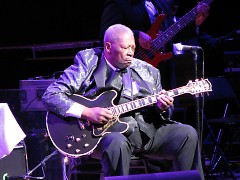B.B. King thrills Grand Rapids at DeVos Performance Hall
He is a living legend at 84. Although he moves with some difficulty, once he takes his place on his chair center stage and delivers that first note from “Lucille,” you know you are in for a treat. Riley King, born 1925 in Indianola, Mississippi came by his more familiar appellation, “B. B.” (Blues Boy), by virtue of the billing he received as a young DJ at radio station WDIA in Memphis. The living legend status set in after a series of concerts he performed at the Fillmore West in San Francisco in 1968 marked his successful crossover to and acceptance from predominantly white audiences. His popularity and reputation has grown exponentially since. On this chilly Sunday evening, just 18 hours post-ArtPrize, B.B.'s legions have come to pay tribute to a genuine American master and icon of the music we call the blues. King draws a wide cross section of ethnicities and ages to DeVos Performance Hall. It is a far cry from the days of playing in all black clubs in West Memphis or turning up to the Fillmore in '68 and finding an all white audience lined up to see him. We all can't help but wonder is this the last time we will see the "King of the Blues" perform?
Long time fans know we will have to wait just a short time longer for King to make his grand entry. As is the custom, his 8 piece band gets the party started with an instrumental version of "Thank You for Loving the Blues." King’s black tuxedo clad minions feature a four piece horn section with each musician proficient on several instruments. Baritone, alto, tenor, and soprano saxophones are covered by two of the men. Trumpet, flugelhorn, and cornet are in and out of the hands of the others. His rhythm section with guitar, bass, drums, and multi-keyboards are as tight and steady rocking as they come.
And then it's time. B.B. King is escorted on stage replete in a brightly colored silk tuxedo jacket, a black silk vest with pin dots, and black tuxedo trousers. Moving slowly with a slight stoop, he settles carefully into his chair and accepts his black Gibson hollow body guitar. He flashes that signature smile, mouth turned up at the corners, eyes closed, and his round face reflecting true satisfaction. He welcomes all 1500 or so of us into his "home" and begins the ongoing conversation that will punctuate the performance. He introduces his band, man by man, and the audience is warmed by his down home banter. Trumpeter James Bolen, rotund bandleader of 29 years and B.B. proclaimed “booty shaker” marshals his forces and launches into "Everybody Wants to Know Why I Sing the Blues."
There are faster and more technical guitar players out there but none as recognizable as the tone King creates with “Lucille.” He plays clearly without distortion, delivering each note with sustain. He is a master of the vibrato, a tremulous effect he achieves by alternating the original tone with a slight variation in the pitch. There are no discordant notes, only melody. Every riff fits. His solos are short and succinct, never overbearing. And then there is the voice.
A voice as recognizable as the guitar, and time has not taken its toll. "Key to the Highway," the old Big Bill Broonzy tune, is a wonderful showcase for King’s vocal ability. He can sing quietly, conversantly, and then deliver the goods with the growls and pleading indigenous to the blues. To watch him sit and play, his interaction with his guitar, with his audience, the facial expressions he displays while he emotes; one is reminded of a big old bullfrog with eyes bulging and face full.
King playfully introduces the song "Ain’t That Just Like a Woman," a jump blues tune that offers the band’s rhythm section a chance to stretch out a bit. Charlie Dennis, a fine guitarist in his own right, takes a turn with his solo followed by the keyboardist, bass player, and drummer. The musicianship between these four fits hand in glove. They can play quietly or they can absolutely rock the house.
The horn section weighs in with the traditional blues tune "I Don’t Want Nobody Else." Stanley Abernathy contributes his soaring trumpet first. Melvin Jackson then chimes in on his soprano saxophone. Inspired by the fine playing and not totally uncharacteristic, King throws his band a curve, jumping in with his own guitar solo after Jackson’s sax. Undaunted, the band plays on while looking at King quizzically, then back at each other and smiling. The boss is having a good time. Bandleader James Bolen brings it all back to earth with a stunning trumpet solo. B.B. King, swaying in his chair, offers the final note as he gives the signal (song over) by chopping down his guitar neck.
As the house quiets King confides his age, 84, and quips, “One thing about being on this planet for a long time, you sure get wiser as you get older.”
He’s visited 90 countries with his music in a career that has spanned 60 years, and he loves to tell the tale of the blues. His music is only part of the experience; we are enthralled with his stories. King introduces a tune from his recent GRAMMY award winning CD, One Kind of Favor. "See That My Grave is Kept Clean" starts with a piano solo as it gathers steam. The keyboardist has alternated throughout the night between Hammond B3 organ, Fender Rhodes electric piano, and concert synthesizer adding layers to every tune and this one is no different. King closes the song with his humble thanks. “Just because you’re a Mississippi blues singer doesn’t mean you’re not supposed to smile.”
The horn section exits to make way for King and his rhythm section and with this final quintet, the king of the blues offers his best. "Early This Morning" features King and “Lucille” as he coaxes her and makes her weep. This core of musicians plays quietly but with a steady groove. King demonstrates his guitar artistry, his voice complementing. Each member of the band adds subtle coloring. King finishes the night with his most famous song and the one everyone has come to hear, "The Thrill is Gone," played with the same power and emotion is it was 35 years ago. As the song wraps up, B.B. King tosses guitar picks to the audience, gold chains too, commemorating this 2009 tour. We have all just witnessed a legend: the king and his court. It is hopefully not for the last time.
Let me tell you, the thrill ain’t close to gone.
The Rapidian, a program of the 501(c)3 nonprofit Community Media Center, relies on the community’s support to help cover the cost of training reporters and publishing content.
We need your help.
If each of our readers and content creators who values this community platform help support its creation and maintenance, The Rapidian can continue to educate and facilitate a conversation around issues for years to come.
Please support The Rapidian and make a contribution today.

